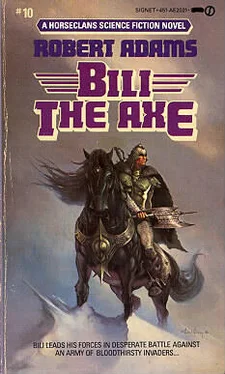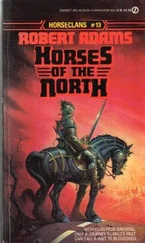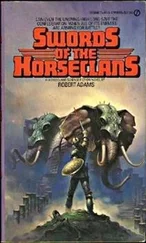And the young war leader felt dirty, used, violated, though he reflected that he never truly had trusted this Prince Byruhn or his motives, had always sensed without- really knowing that the dark waters ran far deeper than Byruhn’s outward demeanor indicated.
“Yes, Lord Champion, you are right.” The immensely strong mindspeak crashed into Bili’s consciousness, not through his shield, but… somehow, someway, around or over or under it. “Prince Byruhn’s treatment of you and yours has been less than what you—and he—would consider honorable from the very start. What he has done, has charged me and the other Kleesahks to do to the minds of your followers, is neither fair nor just. But, please, Lord Champion, try to not judge us or him too harshly, for he feels that he could do no other.”
“I would not have used him so deceitfully, Pah-Elmuh, as he has used me and mine,” Bili beamed silently to the mind of the senior Kleesahk, where he lay with his fellows in the tower keep.
“Ah, Lord Champion, say not such until you have worn for a while Prince Byruhn’s crown, borne the weight of his cares and troubles. Long years ago, a faulty judgment on the part of a man of his house lost one kingdom; now recent events have rendered him frantic that he will be responsible for the loss of yet another kingdom, this land of New Kuhmbuhluhn. It has been my unhappy experience in my long life that desperate men—true men, that is, not Kleesahks or Teenéhdjooks—will often do devious, dastardly, despicable deeds in defense of their own. We Kleesahks do not value mere lands and material things so highly.”
“Then why,” demanded Bili, “did you, do you, lend yourselves and your talents to such dishonorable purposes, Pah-Elmuh?”
“That I would do such was decided long long ago, before first my eyes saw light, Lord Champion. I have told you of the Prophecy, told you of the Last Battle of which you will be Champion and final victor. That battle looms ever nearer to us now, and it were necessary that I did and do the bidding of the prince; otherwise, you might have departed this Kingdom of New Kuhmbuhluhn and all might have then been lost, nor would your own illustrious deeds have been done. Can you not see, Lord Champion?”
“No,” Bili replied bluntly, “I cannot. I see naught but treachery by wizardry, or its near counterpart. Over the last year, you have done many good deeds for me and my folk and I had reckoned you friend. Will you not now reverse the evil you have wrought this night, erase from the minds of my warriors there the counterfeit wishes and aspirations you and the other Kleesahks have implanted therein? A true friend could do, would do no less, Pah-Elmuh.”
Bili could almost hear a deep sigh from the Kleesahk. “I could wish now that my father had seen fit to get me upon a Teenéhdjook, so that I were pure, with nothing of your race within me, Lord Champion. For I find it increasingly hard to behave as a true-man, where duty must be placed above friends and friendship, where necessities of the moment must take precedence to the rightness of actions.
“No, Bili of Morguhn, for all that you have been, are now and will be in time to come, despite the deep affection I bear for you, your brave mate and your fine cub, what has been done will remain done so that what has been foretold will take place when and as foretold. That this must be so, I deeply regret, but so it must be.”
Ahrszin Behdrozyuhn, newly chosen dehrehbeh and war-leader of the Behdrozyuhn Tribe of the Ahrmehnee stahn , lay in the snow just below the brow of a hill. On his right lay two of the leaders of the lowlander force which had been engaged in helping his tribe stem the tide of Muhkohee that had begun to attempt invasions from the west some months before; on his left lay a brawny Moon Maiden and, beyond her, his cousin, Hyk Behdrozyuhn.
Down the slope of snow-covered shale and frozen rocks, some quarter-mile distant, an elongated mob of shaggy, pony-mounted Muhkohee were moving up the valley along both sides of the frozen brook. The savages were proceeding directly into the wind that whipped down the twisting, narrowing valley laden with flecks of ice and the firm promise of more snow yet to come. The cannibal war party rode hunched and miserable-looking, huddled into their furs and ill-cured hides, but with most of their primitive armament clearly in evidence to even the most casual eye.
Then the lowlander farthest right, the one known as Raikuh, spoke in a low tone, for all that the distant foes could not have heard him easily unless he had shouted, and probably not even then.
“There’re a lot of the stinking swine, aren’t there, Son-Geros? Five, six hundred, anyway. They’re no better armed and mounted than any of the others were, but still our numbers are just too small to throw against them openly. So, what do we do? Pull the helpless villagers trick again?”
The man to whom Raikuh spoke might, Ahrszin thought, have been an Ahrmehnee himself, what with his wavy, blue-black hair, dark eyes, deep-olive skin tone and reckless cour-age in battle, save that his nose was too small and his body was not hairy enough. Nonetheless, despite his alienness, Sir Geros Lahvoheetos had won the respect and admiration of all the Behdrozyuhn Tribe many months ago and was accorded the deference that Ahrszin himself received; and the fact that he continued to be modest, unassuming and self-effacing only added to their deep respect and near love for him. The new young dehrehbeh reflected, a bit ruefully, that did this born-lowlander desire it—and he had several times made it clear that he did not—the elders of the tribe would depose him, Ahrszin, in a twinkling and name Sir Geros dehrehbeh in his stead; and Ahrszin was honest enough to admit to himself that such a move would be good for the tribe.
And the tribe needed some good luck. Hardly had they been able to reorganize themselves after the twin disasters of the invasion and pillage by first lowlanders, then a monstrous raiding party of Muhkohee, when earthquake and forest fires wreaked destruction all over the mountains. Then wave after wave of Muhkohee—both family groups and savage war parties—had begun to surge across the western border.
Ahrszin’s father, his uncle Tank—then the dehrehbeh —and many another brave Ahrmehnee warrior had fallen while defending the tribal lands against the inroads of these stinking savages. The Soormehlyuhn Tribe had sent some early aid, but when their border, too, was threatened by the Muhkohee, it had had to be withdrawn, precipitately.
The truly hard times had started at that juncture. Some of the less-defendable villages had had to be abandoned. Livestock that could not be driven or carted in quickly had had to be butchered and the meat left to rot. Standing crops had had to be burned. And despite these painful sacrifices, the tribe had stilt been hard pressed by the seemingly numberless Muhkohee.
Then, on a day of happy memory, Sir Geros and his column had come riding down from the north. A heterogeneous lot they had been—some two score Moon Maidens and a handful of Ahrmehnee warriors from far-northern tribes, mostly Taishyuhns, but with most of the near ten score total consisting of those very same scale-shirted mercenaries who had so savaged and ravaged and raped and burned their gory, charred path through Ahrmehnee lands not very long ago.
The distinctive armor and the nasal dialects of Mehrikan had set Behdrozyuhn teeth edge to edge, and Ahrszin’s eldest cousin, Knahtcho, had to exercise extreme force to prevent incidents of retribution until the bulk of the tribesfolk learned just how great a blessing these grim, steel-sheathed lowlanders were for Behdrozyuhn interests.
Читать дальше












